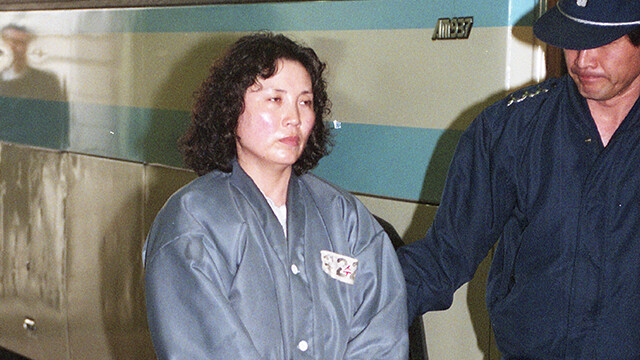
SEOUL, South Korea - Jang Young-ja (81), the notorious South Korean con artist who earned the moniker "the biggest swindler" for her staggering 640 billion won (approximately $500 million USD at the time) promissory note scandal in the 1980s, has once again been handed a prison sentence. South Korea's Supreme Court upheld a one-year prison term last month for Jang's involvement in using over 15.42 billion won (approximately $11.5 million USD) in forged checks in 2017. This latest conviction marks her fifth time being incarcerated, bringing her total time spent behind bars to an astounding 34 years.
The Supreme Court's Second Division, presided over by Justice Park Young-jae, confirmed the appellate court's decision on March 21st, rejecting Jang's final appeal. The charges stemmed from an incident in July 2017, where Jang met with Mr. A, the CEO of an agricultural products company, at a hotel in the affluent Seocho district of Seoul. During this meeting, she allegedly signed a contract to supply agricultural goods and provided Mr. A with forged checks totaling 15.42 billion won as an advance payment. Reports indicate that Jang attempted to appear reformed, telling Mr. A of her desire to "quietly retire and work in the agricultural sector."
The initial trial court had acquitted Jang, citing a lack of conclusive evidence that she was aware of the checks' fraudulent nature at the time of their use. However, the appellate court overturned this decision, delivering a one-year prison sentence in January and immediately detaining her. The appellate court reasoned that a prior similar incident, occurring just a month before, where Jang had given forged checks to another individual for cashing, strongly suggested her awareness of the forgery. The court also highlighted the striking similarities between the two incidents: the identical total value of the forged checks (15.42 billion won), the consecutive numbering of the checks, and the fact that both transactions occurred at the same location, indicating a consistent modus operandi.
Jang's appeal to the Supreme Court was ultimately unsuccessful, with the highest court finding no errors in the lower court's judgment.
Jang Young-ja's name first became synonymous with large-scale financial fraud in the early 1980s. As a relative by marriage of former President Chun Doo-hwan, she, along with her then-husband Lee Cheol-hee, the former Deputy Director of the powerful Korean Central Intelligence Agency (KCIA), orchestrated the monumental 640 billion won promissory note scandal in 1982. This amount represented nearly 10% of the South Korean government's annual budget at the time and was widely labeled as the "largest financial fraud in Korean history," shaking the nation's financial system and political landscape. The scandal led to significant public outcry and implicated numerous high-ranking officials. Jang received a 15-year prison sentence for her role in this infamous case.
Despite her lengthy initial imprisonment, Jang's history of fraudulent activities did not end there. Over the subsequent decades, she repeatedly found herself embroiled in and convicted of further fraud cases involving substantial sums of money, leading to multiple additional prison terms. Most recently, in 2015, she was arrested and indicted for defrauding acquaintances of approximately 600 million won (roughly $450,000 USD). In this instance, she falsely claimed she needed the funds to facilitate the donation of Samsung Everland convertible bonds, purportedly under her late husband's name, to a foundation. The Supreme Court upheld a four-year prison sentence for this crime in 2020, and she was released on parole in early 2022.
This latest conviction and subsequent imprisonment underscore Jang Young-ja's persistent involvement in financial crime, solidifying her legacy as one of South Korea's most notorious and enduring swindlers. Her repeated offenses and the significant sums involved have consistently captured public attention and raised questions about financial oversight and the cycle of recidivism. At 81 years old, this fifth prison sentence effectively marks a significant portion of her adult life spent behind bars, totaling an unprecedented 34 years.
[Copyright (c) Global Economic Times. All Rights Reserved.]




























